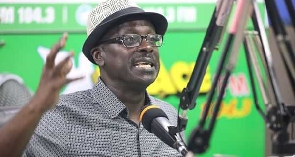Prof Stephen Kwaku Asare (aka Kwaku Azar), D&D Fellow in Public Law and Justice at CDD-Ghana, has given a detailed explanation of why the people of Santrokori, Akpafu, Lipke and Lolobi (SALL) are not represented in the 8th Parliament.
He said that SALL was assigned to Buem constituency under Constitutional Instrument (CI 128), which drew the constituency map for the 2020 elections. CI 128 superseded CI 95 and effectuated the Supreme Court directive in the ‘Dzate case’ relating to ensuring the proper alignment of constituencies to avoid their straddling two regions.
On Election Day (December 7, 2020), voters from SALL were allowed to vote in the Buem constituency for the Presidential elections, but were directed by the EC not to participate in the Parliamentary elections because of the pendency of the creation of the Guan constituency.
The directive, Kwaku Azar said, “was unconstitutional because only another CI, not a directive, can undo an existing CI”.
He added: “Administrative bodies should be trained to understand that statutory instruments are law and cannot be dispensed with by fiat, directive or press release.”
In effect, the electorate of SALL are not represented in the 8th Parliament of Ghana.
The accounting professor further explained: “we are where we are because of an unconstitutional action by the Electoral Commission (EC) in issuing a directive to amend CI 128.”
Prof Asare suggested that there is the need for the EC to create the promised Guan constituency on an urgent basis to allow SALL to be seated in Parliament immediately.
“Every day that the EC does nothing is another day that SALL voters are denied what the Constitution guarantees them. Of course, the Constitution provides that when a new constituency is created, it shall come into effect upon the next dissolution of Parliament.
“This makes sense because we do not want to empower the EC to affect or dilute the composition of Parliament after all the registered voters have been given an opportunity and have spoken in a general election.
“But what if not all the people were allowed to speak in the general election? What if the EC willfully excluded some people from participating in the general election? Will the constraint hold or be applicable?” Kwaku Azar quizzed in his statement.
He observed that the EC’s willful exclusion of some people from participating in elections is something so extraordinary that no reasonable framer of the Constitution could have contemplated that it could happen.
“As such, the Constitution itself provides no direct remedy. This, however, does not mean the issue becomes an Article 298 issue calling for Parliament to fix with its residual power. Rather, it is a clear violation of the Constitution that calls for judicial review and resolution.
“A mandamus clearly lies here! But what should be its nature? Should the EC be ordered to undo the Buem election and ask the people to vote again? Buem voters have done no wrong and should not be denied the benefit of their election bargain.
“The EC must be compelled to create the promised Guan constituency and to organize a special election within 30 days!” Kwaku Azar stressed.
He noted that the solution is justified on grounds that the EC has publicly conceded that, but for its negligence, SALL voters would have been assigned to Guan constituency for purposes of the Parliamentary election.
“The other obvious solution which has no chance of happening is to hold the tortfeasor, here the EC, accountable for violating the Constitution. The core mandate of the EC is to divide the country into as many constituencies for the purpose of election of MPs as it may prescribe, so that each constituency is represented by one MP. The EC has 4 years to do this and did so with the issuance of CI 128 in August 2020,” Prof Stephen Kwaku Asare said.
Politics of Friday, 2 April 2021
Source: www.ghanaweb.com
How EC’s unconstitutional action denied SALL rep in Parliament – Kwaku Azar explains
Entertainment
















